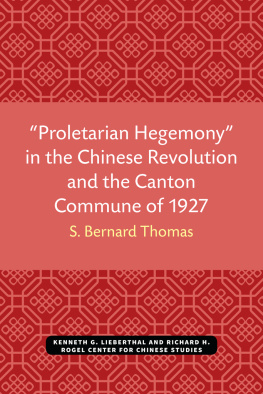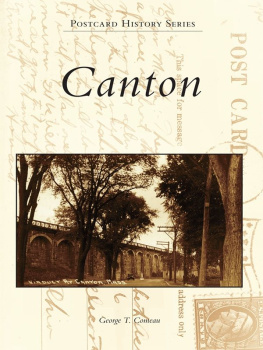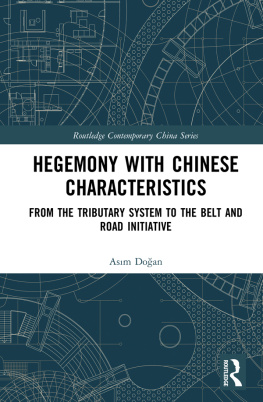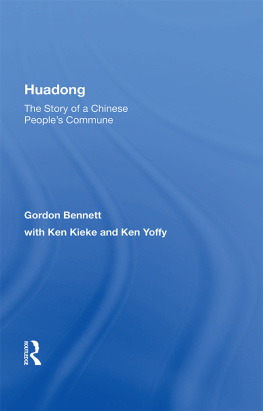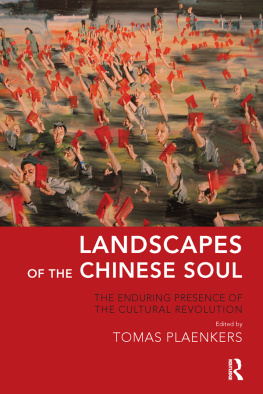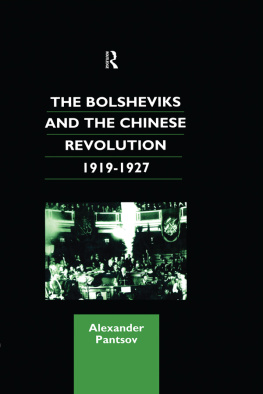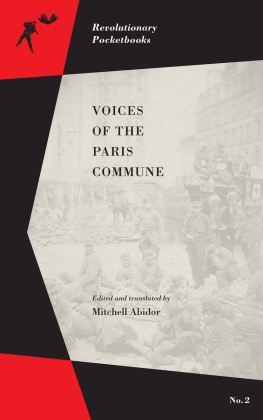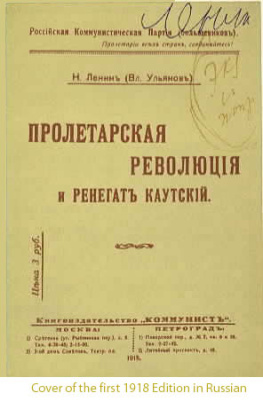S. Bernard Thomas - “Proletarian Hegemony” in the Chinese Revolution and the Canton Commune of 1927
Here you can read online S. Bernard Thomas - “Proletarian Hegemony” in the Chinese Revolution and the Canton Commune of 1927 full text of the book (entire story) in english for free. Download pdf and epub, get meaning, cover and reviews about this ebook. year: 1975, publisher: Kenneth G. Lieberthal and Richard H. Rogel Center for Chinese Studies, genre: Politics. Description of the work, (preface) as well as reviews are available. Best literature library LitArk.com created for fans of good reading and offers a wide selection of genres:
Romance novel
Science fiction
Adventure
Detective
Science
History
Home and family
Prose
Art
Politics
Computer
Non-fiction
Religion
Business
Children
Humor
Choose a favorite category and find really read worthwhile books. Enjoy immersion in the world of imagination, feel the emotions of the characters or learn something new for yourself, make an fascinating discovery.
- Book:“Proletarian Hegemony” in the Chinese Revolution and the Canton Commune of 1927
- Author:
- Publisher:Kenneth G. Lieberthal and Richard H. Rogel Center for Chinese Studies
- Genre:
- Year:1975
- Rating:3 / 5
- Favourites:Add to favourites
- Your mark:
- 60
- 1
- 2
- 3
- 4
- 5
“Proletarian Hegemony” in the Chinese Revolution and the Canton Commune of 1927: summary, description and annotation
We offer to read an annotation, description, summary or preface (depends on what the author of the book "“Proletarian Hegemony” in the Chinese Revolution and the Canton Commune of 1927" wrote himself). If you haven't found the necessary information about the book — write in the comments, we will try to find it.
“Proletarian Hegemony” in the Chinese Revolution and the Canton Commune of 1927 — read online for free the complete book (whole text) full work
Below is the text of the book, divided by pages. System saving the place of the last page read, allows you to conveniently read the book "“Proletarian Hegemony” in the Chinese Revolution and the Canton Commune of 1927" online for free, without having to search again every time where you left off. Put a bookmark, and you can go to the page where you finished reading at any time.
Font size:
Interval:
Bookmark:

THE UNIVERSITY OF MICHIGAN CENTER FOR CHINESE STUDIES
MICHIGAN PAPERS IN CHINESE STUDIES
NO. 23
PROLETARIAN HEGEMONY IN THE CHINESE REVOLUTION AND THE CANTON COMMUNE OF 1927
by
S. Bernard Thomas
Ann Arbor
Center for Chinese Studies
The University of Michigan
1975
Open access edition funded by the National Endowment for the Humanities/Andrew W. Mellon Foundation Humanities Open Book Program.
Copyright 1975
by
Center for Chinese Studies
The University of Michigan
Printed in the United States of America
ISBN 978-0-89264-023-2 (hardcover)
ISBN 978-0-472-03827-5 (paper)
ISBN 978-0-472-12792-4 (ebook)
ISBN 978-0-472-90188-3 (open access)
The text of this book is licensed under a Creative Commons Attribution-NonCommercial-NoDerivatives 4.0 International License: https://creativecommons.org/licenses/by-nc-nd/4.0/
To Evelyn
CONTENTS
Research for this study was much facilitated by a Fulbright-Hays Research Fellowship for 19691970 and by two small research grants from Oakland University in 1969 and 1973. I am indebted for their many kindnesses and expert assistance to the directors and staffs of the Universities Service Centre in Hong Kong, the Hoover Institution at Stanford University, the Asia Library of The University of Michigan, and the Kresge Library of Oakland University. I wish to thank Professor Daniel Bays of the University of Kansas, Professor Renate Gerulaitis of Oakland University, and Tanya Marcotty for their generous help. I am grateful to Professor Robert C. Howes of Oakland University for expert translations from the Russian sources used. I want also to express my great appreciation to Mr. Shih-chen Peng of Oakland Universitys Chinese language faculty for his unstinting and invaluable assistance with difficult and sometimes barely legible Chinese microfilm materials. The hours we have spent together on this and other projects over recent years have further cemented our good friendship.
As is true of so many of my colleagues at Oakland, I owe very special thanks to Marian Wilson, our extraordinarily talented editorial secretary, who, with her customary skill and devotion, took the manuscript through successive drafts to the final copy. Any errors in fact or interpretation are of course solely my responsibility. My greatest debt and gratitude is expressed in the dedication.
S. Bernard Thomas
| ACFL | All-China Federation of Labor |
| CCP | Chinese Communist Party |
| CC, CCP | Central Committee, Chinese Communist Party |
| CI | Communist International or Comintern |
| ECCI | Executive Committee, Communist International |
| CPSU | Communist Party of the Soviet Union |
| KMT | Kuomintang |
The Communist-organized Canton uprising of December 11, 1927, which proclaimed the Canton Commune or Soviet, proved to be a short-lived and disastrous affair lasting less than seventy-two hours. However, it immediately thereafter took on and long retained a meaningful symbolic role in the intricate fabric of ideological formulations, policies and strategies which marked the Chinese Communist movement and its relations with the Comintern during most of the decade following the collapse of the Commune. It was the Canton revolt, the Comintern proclaimed on the first anniversary of the Commune, which constituted the banner of the new Soviet phase in the Chinese revolution. A careful review of the political and rhetorical uses of the Canton Commune in both Comintern and Chinese Communist sources may throw some additional light on the complex and often ambiguous policy lines of the post-1927 soviet stage of Chinese Communism, particularly on the key issue of proletarian hegemony and its link to the urban-rural strategic relationship. Indeed, as I shall note, continuing references to and assessments (or the absence thereof) of the Canton uprising in Chinese Communist and Soviet Russian commentaries since 1949 appear to have a certain relevance to similar issues in postliberation China as well.
The Canton Commune was in fact an unmitigated disaster for the Communist revolutionary movement in China. Though it was marked by great heroism and was at least in part the expression of a still powerful radical labor movement in that city, the revolt was nevertheless speedily and ruthlessly crushed with severe losses to the Communist cadre nucleus in Canton, thus largely destroying the strong organizational base the party had been able to build in that original stronghold of the nationalist revolution.
Whether or not the uprising was initiated, as is often asserted, on direct orders from Stalin or the Stalin-directed Comintern,
Yet basically the Canton Soviet, which declared itself to be the organ of the revolutionary democratic dictatorship of the workers and peasants, can be viewed as at least the symbolic culmination of a policy line which the Comintern had been evolving under Stalins direction during the previous eighteen months in response to sharply shifting developments in China and in the process of countering the criticisms and challenges of the Trotsky-led Left Opposition. And while the uprising was finally acknowledged to have been, strategically, a rear-guard action of a receding revolutionary wave, it played a significant ideological role for the revolutionary period ahead by setting the appropriate proletarian political parameters for the democratic dictatorship of workers and peasants of the ensuing, primarily rural soviet period. The Commune served also, in a figurative sense, to place the post-1927 CCP-led revolution more firmly within the internationalist orbit of the Comintern-led proletarian world revolution, and it carried as well certain longer-term political and strategic implications for the ultimate course of the Chinese revolution. And, as I have already suggested, post-1949 Chinese and Russian assessments of the Canton Commune have apparently continued to speak to some of these same issues.
The Communist aim of proletarian hegemony in the Chinese revolution was given concrete expression through the Canton Commune--reflected in the policies and strategies that led to the uprising, in the makeup and program of the Soviet setup in Canton, and in the subsequent assessment of the revolt by the Comintern and the CCP. This study will describe these developments and, with the further ideological treatment given the Commune serving as a backdrop, will then examine the continuing evolution and ultimate transformation of the proletarian line and the concept of proletarian leadership in the post-1927 history of Chinese Communism.
FOOTNOTES
. The First Anniversary of the Canton Revolt (Theses of the Agitprop of the ECCI), International Press Correspondence ( Inprecorr), VIII: 89 (December 13, 1928), 1696.
. Harold Isaacs, The Tragedy of the Chinese Revolution, 2nd ed. rev. (Stanford, 1961), pp. 290291. J. C. Huston, American consul in Canton, estimated that in the week of December 1320 alone, some 3, 0004, 000 radicals and suspected radicals were summarily executed. Peasants, Workers and Soldiers Revolt of December 1113, 1927, at Canton, China (December 30, 1927), p. 28, Hoover Library microfilm. Hereafter cited as Huston Report.
The CCP itself stated that 5, 700 persons had been killed in the December 1419 aftermath of the uprising. In Memory of Fallen Heroes5700 Workers, Peasants and Soldiers of Canton, Bolshevik ( Pu-erh-se-wei-ko), no. 12 (January 1928), p. 354, included as a document in L. P. Deliusin, ed., Kantonskaia Kommuna [The Canton Commune] (Moscow, 1967), p. 207. Hereafter cited as Kantonskaia Kommuna. This important Russian-language collection of essays and documentary materials on the Commune was issued under the auspices of the Institute of the Peoples of Asia of the USSR Academy of Sciences for the fortieth anniversary of the Canton uprising. I will give only the English translation of titles cited from this collection.
Font size:
Interval:
Bookmark:
Similar books «“Proletarian Hegemony” in the Chinese Revolution and the Canton Commune of 1927»
Look at similar books to “Proletarian Hegemony” in the Chinese Revolution and the Canton Commune of 1927. We have selected literature similar in name and meaning in the hope of providing readers with more options to find new, interesting, not yet read works.
Discussion, reviews of the book “Proletarian Hegemony” in the Chinese Revolution and the Canton Commune of 1927 and just readers' own opinions. Leave your comments, write what you think about the work, its meaning or the main characters. Specify what exactly you liked and what you didn't like, and why you think so.

